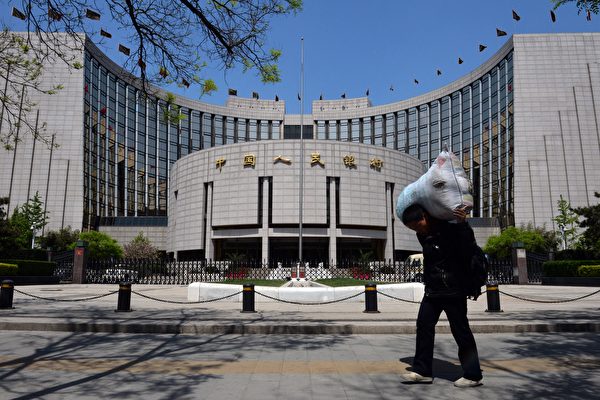In recent years, China’s economy has been slowing down, leading to a surge in small and medium-sized enterprise closures and an increasingly severe debt crisis. Against this backdrop, the emergence of “professional debtors” and “professional shop closures” as emerging gray industry chains has garnered widespread attention. Experts analyze that these phenomena are not only direct results of economic downturn pressure but also expose the fragility of the social credit system and market order during the economic transformation period, highlighting the profound impact of institutional flaws on the economic ecosystem.
Shenzhen courts recently disclosed two personal bankruptcy liquidation applications, sparking public outcry. One retired couple, whose combined monthly income is about 12,000 yuan, declared debts exceeding 120 million yuan; while a 37-year-old woman with a monthly salary of only 4,784 yuan was burdened with over 25.44 million yuan in debt. The vast gap between income and debt in these cases raises doubts about the existence of “professional debtors”.
Official data shows that since 2023, the number of bankruptcy cases concluded in China has significantly increased, reflecting the continuous financial pressure on businesses and individuals amidst the economic slowdown.
Behind these “bizarre cases” lies a group known as “professional debtors” gradually emerging. In some cases, the debtors are not actual operating entities but individuals serving as “fronts” with legal person status. According to media reports, these “professional debtors” can receive “compensation” ranging from 5% to 30% of the debt amount. However, such behavior carries significant legal risks, as bankruptcy applications may be rejected if fraud is confirmed, leading those involved to face criminal liability.
Beijing practicing lawyer Chen Feng (alias) told Epoch Times, “In recent years, cases where loans are guaranteed under another person’s identity have been increasing. Even if the parties were deceived into using their identity, courts usually hold them responsible for repaying the loan obligation.”
Chen had represented a financial case in Guizhou involving collusion between a bank manager and a business owner, utilizing the personal information of several low-income individuals to secure loans, resulting in a woman being ordered to repay over tens of millions of yuan in debt. He stated, “Such cases often involve cooperation from personnel within financial institutions, revealing structural loopholes in the financial regulatory system, allowing gray industry chains to thrive. This not only erodes national financial assets but also poses a threat to the social credit system.”
Another mainland practicing lawyer, Huang Ming (alias), attributes this phenomenon to risk-shifting strategies within companies. He explained, “Many small and medium-sized enterprises in China face high tax burdens and funding difficulties, causing some business owners to change the company’s legal entity to a ‘front,’ particularly using elderly individuals or out-of-town workers with lower economic and cultural levels.”
He added, “While the business owner remains the actual controller, their legal responsibilities have been transferred. Such operations, while avoiding short-term risks, often evolve into illegal debt evasion and financial fraud.”
Even more concerning is that some private commercial training institutions openly recommend such operating methods, further promoting the dissemination of gray practices. Lawyer Huang Ming candidly stated, “This mode of operation persists primarily due to weak law enforcement, excessively high corporate compliance costs, and ineffective institutional supervision.”
Associated with “professional debtors” is the emergence in recent years of the phenomenon of “professional shop closures” within China’s service industry.
Especially in prepaid sectors such as education training, fitness, and beauty, when the funding chain breaks, operators often hire “shop closure personnel” to handle post-closure affairs. Their duties include legal entity changes, course transfers, student arrangements, and managing labor disputes.
According to mainland media investigations, “shop closure personnel” charge exorbitant fees, collecting service fees ranging from 10% to 30% of the debt amount, with their operational processes being secretive and complex. In many cases, consumers are not refunded, and are forced to accept services like manicures, massages, etc., as substitute compensation, causing secondary harm to consumers.
Furthermore, “professional shop closure personnel” provide certain business owners with illegal “escape” convenience, reducing the cost of “disappearing,” disrupting normal commercial order, and raising ethical risks.
Former Beijing practicing lawyer and current chairman of the Canadian Democratic Front, Lai Jianping, defines the phenomena of “professional debtors” and “professional shop closures” as “pathological economic phenomena bred in China’s society due to institutional distortions.”
Lai Jianping told Epoch Times that these phenomena are mainly caused by both economic and political factors in China. The reduced vitality of the Chinese economy has made it difficult for many lower-class individuals to survive, leading them to turn to “crooked paths” for profit through various deceitful means as legitimate channels for livelihood become unviable.
He further analyzed how criminals plot ways to borrow from banks or incur debts through various means, ultimately burdening these bottom-tier individuals who serve as tools with economic and social responsibilities. He emphasized that this results in a “collapse of the entire society’s credit, with everyone immersed in mutual deceit and fraudulence.”
In the current economic pressure environment, the increasing number of closures among China’s private enterprises, low market confidence, deteriorating financing conditions, and escalating employment pressures are pushing certain social groups towards the gray margins.
Faced with the above gray industry chains, Lai Jianping suggests that lower-class individuals should maintain basic legal knowledge and moral standards: “It is better to endure economic difficulties than sacrifice personal credit and social responsibility for short-term gains.”
He emphasized that the proliferation of gray industry chains is not just a problem of individual behavior but an external manifestation of a structural crisis in society. Only by making fundamental adjustments through institutional reform, legal construction, and social governance at the grassroots level can we truly curb the spread of such phenomena.

